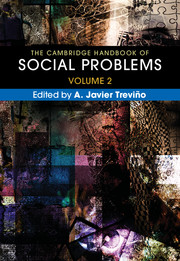Book contents
- The Cambridge Handbook of Social Problems
- The Cambridge Handbook of Social Problems
- Copyright page
- Contents
- About the Contributors
- Introduction
- Part I Problems Related to Health, Safety, and Security
- Chapter 1 Illness and Health Care
- Chapter 2 Mental Illness and Social Problems
- Chapter 3 Substance Abuse
- Chapter 4 Epidemics, Pandemics, and Outbreaks
- Chapter 5 Disaster as Social Problem and Social Construct
- Chapter 6 Surveillance
- Chapter 7 Domestic Spying: A Historical-Comparative Perspective
- Chapter 8 Computer Hacking as a Social Problem
- Chapter 9 War and Militarism
- Chapter 10 The Social Problem of Terrorism
- Chapter 11 Genocide
- Part II Problems Related to Crime and Violence
- Part III Problems of Global Impact
- Index
- References
Chapter 8 - Computer Hacking as a Social Problem
from Part I - Problems Related to Health, Safety, and Security
Published online by Cambridge University Press: 16 March 2018
- The Cambridge Handbook of Social Problems
- The Cambridge Handbook of Social Problems
- Copyright page
- Contents
- About the Contributors
- Introduction
- Part I Problems Related to Health, Safety, and Security
- Chapter 1 Illness and Health Care
- Chapter 2 Mental Illness and Social Problems
- Chapter 3 Substance Abuse
- Chapter 4 Epidemics, Pandemics, and Outbreaks
- Chapter 5 Disaster as Social Problem and Social Construct
- Chapter 6 Surveillance
- Chapter 7 Domestic Spying: A Historical-Comparative Perspective
- Chapter 8 Computer Hacking as a Social Problem
- Chapter 9 War and Militarism
- Chapter 10 The Social Problem of Terrorism
- Chapter 11 Genocide
- Part II Problems Related to Crime and Violence
- Part III Problems of Global Impact
- Index
- References
Summary
This chapter introduces the ideas and practices of digital technology enthusiasts who fall under the umbrella term of “hackers.” We will discuss how their defining activity has been constructed as a social problem and how that construction has been challenged. The chapter concludes with several policy suggestions aimed at addressing the more socially troublesome aspects of computer hacking.
- Type
- Chapter
- Information
- The Cambridge Handbook of Social Problems , pp. 127 - 142Publisher: Cambridge University PressPrint publication year: 2018
References
- 2
- Cited by



